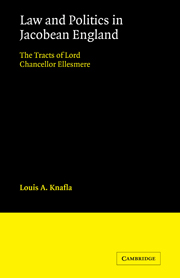Summary
The life and career of Sir Thomas Egerton, Lord Ellesmere, bears vivid testimony to the axiom that the shape and texture of Britain's landscape has had a major influence on its people. Egerton's world was the northern borderland of England and Wales, an area which comprised Cheshire, Denbighshire, Flintshire, and northern Shropshire. Known as the northern lowland region of the Welsh marches, this area of Britain had been in the backwater of Britain's historical development from the mid-fourteenth century to the advent of Tudor rule. But it witnessed in the sixteenth century a significant revival. The intensification of dairy farming, together with the mining of coal and iron ore, broadened the region's wealth and increased its exports. This invigorated economic foundation spurred the growth of the port of Chester and the market towns of Oswestry, Whitchurch, and Shrewsbury. A new Anglo-Celtic gentry class, acquiring the lands of the decimated feudal nobility, developed in both town and country to provide the basis of a new ruling elite. Grammar schools were founded, contributing to an increase in literacy, the development of the arts, and a religious reformation. Thus in the sixteenth century the people of this region had economic, social, cultural, and religious experiences which began to bring them into the mainstream of English life on the Midland plain that stretched below them.
The future Lord Chancellor was raised in the Dee valley, a stretch of rich greensward which forms the western half of this lowland region.
- Type
- Chapter
- Information
- Law and Politics in Jacobean EnglandThe Tracts of Lord Chancellor Ellesmere, pp. 1 - 36Publisher: Cambridge University PressPrint publication year: 1977



